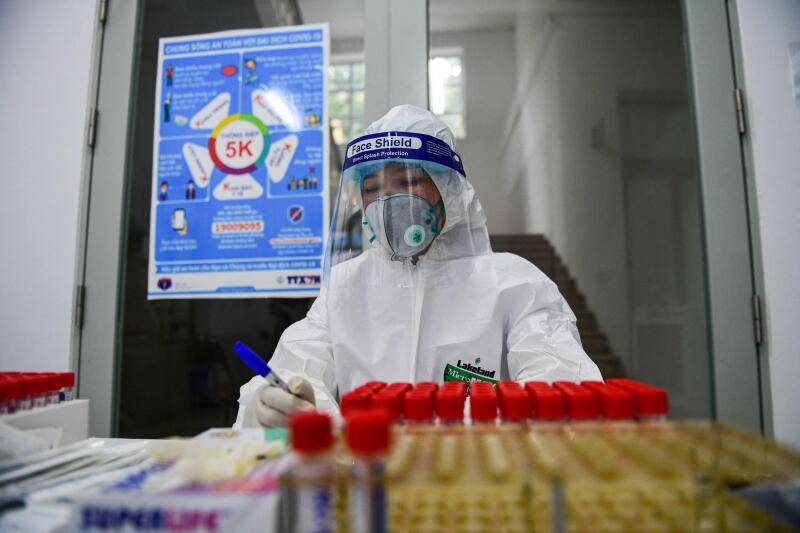Vietnam's 4th wave of Covid-19 is its first 'real wave', after earlier blips
Sign up now: Get insights on Asia's fast-moving developments

Since the pandemic began, the country of 98 million people has had only around 4,600 cases.
PHOTO: AFP
Vietnam's fourth Covid-19 wave, which began late last month, is the country's biggest yet. In just a few weeks, over 1,600 cases have been recorded in 28 cities and provinces, including the capital Hanoi as well as industrial parks in Bac Giang and Bac Ninh.
The particularly transmissible B16172 variant, a sub-lineage of the B1617 variant first identified in India, has been found in several community cases sampled.
In reality, this is Vietnam's first "real wave", said epidemiologist Michael Toole from Melbourne's Burnet Institute. "The other 'waves' were blips," he told The Straits Times.
Since the pandemic began, the country of 98 million people has had only around 4,600 cases - fewer than a tenth of Singapore's.
So successful was Vietnam in beating back earlier bouts of the virus that it managed to grow by 2.9 per cent last year when most of the world's economies were contracting.
Communist-run Vietnam made up for relatively low rates of testing by aggressively tracing and isolating contacts of infected persons as well as their contacts.
Under its system, those in close or prolonged contact with infected persons, termed "F1", are quarantined at a government facility for 21 days even if they are negative for the virus.
F2s - those in close contact with F1s - are required to isolate themselves at home.
Localities affected by outbreaks are strictly locked down, while life in other parts of the country is allowed to go on as usual.
But vaccination in Vietnam has been slow. As of Tuesday, only 28,852 people had been fully vaccinated. About one million doses have been administered from the AstraZeneca vaccine supply it received through direct purchase or the Covax scheme. It is also negotiating to buy doses of Pfizer-BioNTech's vaccine to accelerate the inoculation.
In an interview with local media last week, Health Minister Nguyen Thanh Long said the fourth wave was more "complicated" than previous ones. He attributed the outbreak to foreign experts who visited Vietnam and lax isolation procedures, as well as the new, more infectious variant.
Asked if Vietnam would be able to get on top of this current outbreak if vaccinations continue at the same pace, Professor Toole said: 'It's going to be very difficult, unless they go the way of the national lockdown... They would be very hesitant to do that, but they may have to."
Business owners jittery about the new wave are requesting to buy their own vaccines.
Mr Tan Tai Nguyen, chief executive of a hospitality company in Danang, told ST: "We want to vaccinate our staff and we are ready to pay for it. However, when we asked the local government what vaccine we can access, we do not get a clear answer."
His company has been hit by the latest outbreak as one of its employees has been identified as an "F2".
"We were supposed to process a contract valued over 20 billion dong (S$1.15 million), but all our staff are required to work from home for 21 days," he said. "As a result, we cannot sign and hand over any contract in the next 21 days. This is a huge loss for us."
Mr Nguyen Quoc Toan, chief executive of EQuest Education Group, said the country needs to do everything possible to expedite the purchase of vaccines.
"We have won against some outbreaks, but it doesn't mean that we will win the tough war with this pandemic. We hope there wouldn't be a situation where many countries in the region finish their vaccination programmes and Vietnam has not secured enough doses for its people," he said.
"It is not fun to think of a future where the world has returned to normal and Vietnam hasn't."
Additional reporting by Pham Lan Phuong



